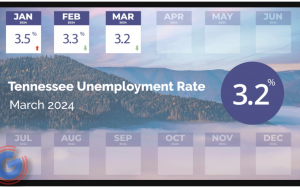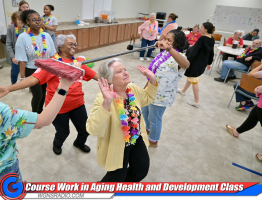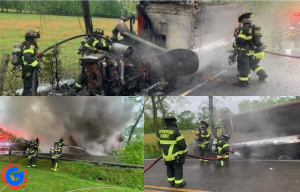Tuesday, the U.S. Department of Education released the America's College Promise Playbook, a comprehensive and up-to-date resource guide that provides practitioners with relevant and actionable information about how they can offer more students access to an affordable, high-quality education through which students can go as far as their talents and work ethic can take them.
Inspired by the President's America's College Promise plan to make two years of community college free for responsible students, letting students earn the first half of a bachelor's degree or an associate degree and earn skills needed in the workforce at no cost, the playbook focuses on strategies that bring partners together to serve students across all stages of their college and career pathways. The America's College Promise proposal influenced the design of the largest city-wide free community college program to date, the Los Angeles Promise.
"Last year, the President set forth a bold vision to make two years of college as universal as high school was a century ago, helping students earn the first half of a bachelor's degree and earn skills needed in the workforce at no cost," said U.S. Education Secretary John B. King Jr. "Community colleges are not just a distinctly American institution, but as the largest, most affordable segment of America's higher education system, they are critical to reaching the President's goal to have the highest share of college graduates in the world and to ensuring America's economic prosperity in the future."
On Tuesday, as part of the Department's 2016 Opportunity Across America Bus Tour, Secretary King will visit Pellissippi State Community College in Knoxville, Tennessee where President Obama originally announced the America's College Promise proposal, which was inspired by Tennessee's efforts, in January 2015.
As one of the clearest paths to the middle class, higher education has never been more important. Over the next decade, the number of jobs requiring some level of higher education is expected to grow more rapidly than those that do not, with 11 of the 15 fastest-growing occupations requiring postsecondary education. At a time when jobs can go anywhere in the world, skills and education will determine success for individuals and for nations.
Yet, far too many students either don't go to college or never finish their degree. The President has proposed a new $61 billion investment over the next decade for America's College Promise to create a new partnership with states to help them waive tuition in high-quality programs for these students, while promoting key reforms to help more students complete at least two years of college and help meet the demands of a growing global economy.
America's more than 1,300 community colleges play an important role in addressing the educational and labor market needs of communities throughout the country. Currently, 40 percent of all undergraduates --or roughly 7 million students--are enrolled in these institutions that offer an affordable route to a credential or four-year college degree.
Since the President announced America's College Promise, at least 36 free community college programs have launched in states, cities and community colleges throughout the country, increasing the total estimate of free community college programs to more than 150. Together, these new programs alone have added more than $150 million in new investments in community colleges to serve 180,000 students.
As more communities explore how they can pursue community college reforms, the playbook provides program design elements from America's College Promise and other common features of free community college programs that they can adopt and customize based on their community and student needs.
The playbook being released Tuesday offers actionable information and strategies on how communities can develop programs and partnerships to:
- Expand college access for hard-working students through tuition-free community colleges.
- Strengthen and reform the community college experience to promote gains in student enrollment, persistence, completion or transfer with subsequent completion at a four-year institution, and employment. And,
- Prepare students for continued education and/or high-demand, middle-class jobs.
The playbook also outlines five key steps that communities have used in launching successful America's College Promise programs. Such as:
- Identifying community needs and opportunities. Successful Promise programs tend to demonstrate effective use of a grassroots and community-led effort to design tailored programs that meet the specific needs and strengths of their communities and students.
- Building a team and developing partnerships to strengthen educational quality. Funding alone will not address all needs. The playbook describes how meaningful reform around college preparation, completion, and job placement will require involvement from everyone, including policymakers, schools, employers, community-based organizations, foundations, investors, and students.
- Designing a high-quality program that serves the community's and students' needs. Students are more likely to make academic progress and complete college if they receive support obtaining financial aid, explore and have early exposure and experiences with career opportunities, choose a program of study, and develop an academic plan based on program maps created by faculty, employers, and advisors. The playbook outlines student and program eligibility criteria that are aligned with those efforts.
- Developing a sustainable funding model. When designing Promise programs, communities must consider how to optimize impact given the resource availability and need for sustainable growth. The playbook showcases different costs and financing mechanisms at the local, state, and community college levels.
- Evaluating and assessing program effectiveness to learn what works for continuous improvement. Building a feedback loop can help ensure that free community college programs continue to improve. The playbook suggests an evaluation framework, as well as student-oriented and community-oriented metrics, to ensure that the program is serving the community's and students' needs.
The playbook offers case studies of Promise programs from various levels--state, city, urban, and rural--to provide communities with various design options and strategies to allow them to develop programs that best suit their needs.
At the state level, the playbook showcases the Tennessee Promise program. The program serves over 16,000 students and is contributing to a 10 percent increase in public higher education enrollment and a 25 percent increase at community colleges throughout Tennessee. Each student is connected with a mentor, and significantly fewer students are taking remediation, which increases the likelihood of college completion. Tennessee has also seen the highest year-over-year gain in the percentage of graduating high school students who filed the FAFSA, according to a recent analysis.
As a city-wide program, the playbook features Boston Free College Community, a program focused on eliminating barriers to a college degree and addressing the economic disparities in Boston. The city expects the program to eventually serve up to 400 students annually. It provides an integrated model of support services, bridge programs, dual enrollment, remedial classes, and resources that will connect students with employment opportunities, career navigation services, and financial aid advising. To be eligible, students must be graduates of Boston Public Schools, be Pell-eligible, earn at least a 2.0 GPA in college, and complete community college within three years.
As an urban community college effort, the Long Beach College Promise has served 8,000 students since 2008 with one year of free community college. The Long Beach College Promise focuses on building a culture of education in the community with students exposed to the possibility of college as early as the fourth grade, boasts a 90 percent college enrollment rate within two years of high school graduation, and significantly higher transfer and graduation rates. Students must enroll immediately after graduating from a local high school; take at least 12 credit hours; maintain a 2.0 GPA, and participate in activities, support services, and events provided by Promise Pathways that support my academic goals
The Dabney Promise Today is featured in the playbook as a rural community college program. Announced in February, about 50 students are expected to participate in the program this fall at Dabney S. Lancaster Community College in Clifton Forge, Virginia. Students will be enrolled at least three-fourths full-time to promote persistence and on-time completion and maintain a 2.25 GPA. Students must also complete at least four hours of community service to give back to those who helped to finance a portion of their costs to attend college and make their participation in higher education a reality.
Community colleges are also uniquely positioned to partner with employers to create tailored training programs to meet economic needs within their communities in fields such as nursing, health information technology, and advanced manufacturing. Effective employer-community college partnerships featured in the playbook include Alpena Community College in Michigan and the Collin County Community College District in Texas.












